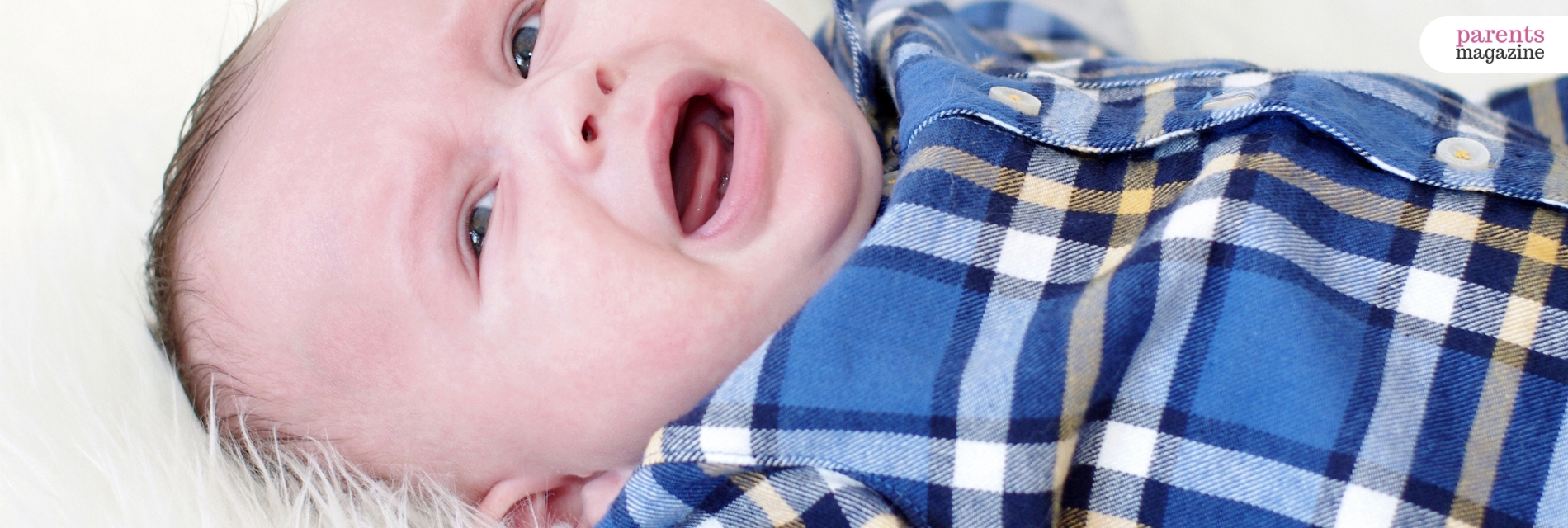
5 Months Sleep Regression: How to Deal with Sleep Regression?
“5 months sleep regression”
Did you type this on your browser’s search bar?
Sleep regressions and midnight wake-up calls are terrifying to most parents.
Sometimes, they don’t know how to respond to these calls. Most of the time, they don’t know if this is a sleep regression. Is there a 5 month sleep regression?
It’s alright to have all these questions. If you read this blog, you have landed on the right page for a helpful answer.
What’s Sleep Like for Five Months Old?
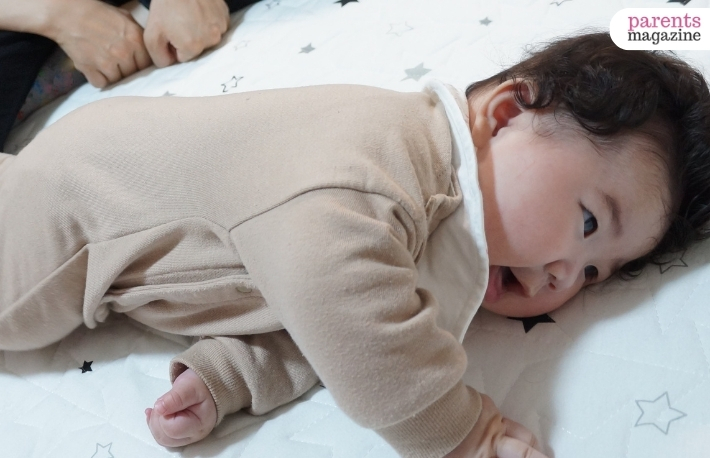
When your baby is 5 months old, you may notice a change in their sleep pattern. The erratic sleep behaviors of their early newborn days have stopped. They have also transitioned through the 4-month sleep regression and are becoming calmer than before.
5 months of age brings stability to your child’s sleeping behavior. But that’s only until they can transition into 6-month sleep regression.
Your child is constantly growing, changing, and developing – physically and cognitively. But you must prioritize maintaining a proper sleeping schedule and bedtime routine. It will help you build your sleeping habits. Plus, they need sound and routine sleep, and so do you.
5-month-old babies are strong and capable enough to roll independently.
They are more mobile and would love to move around in their bed. A good and always recommended practice for caregivers is putting babies to sleep on their backs. This helps prevent Sudden Infant Death Syndrome.
But don’t panic if they roll over to one side during sleep. It’s normal, and there’s no need to reposition them.
But What About 5 Month Sleep Regression?

Your baby is unique; in fact, all babies are. Each of them has a different pace of physical development. Some babies experience their 4-month sleep regression at 5 months of age.
But some face this regression a little late and at 6 months. Sometimes, they can face the development of 6 months a little early. In any case, if they end up having sleep regression, it’s good on their part. It can be a sign of progression.
Your child might be experiencing physical or emotional development milestones, hence sleep regression. Sleep regression at the age of 5 months can be related to the following developments –
5 Months of Sleep Regression & Physical Development of Your Child
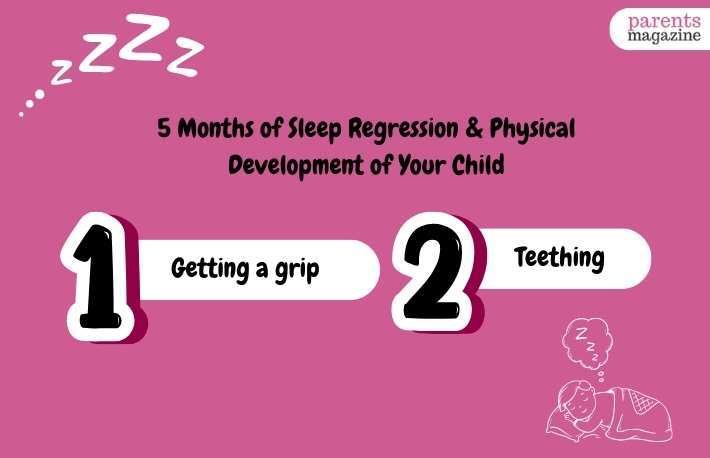
Rolling over: As your baby enters the age of 5 months, they start to roll over during sleep. They move from their tummy to the back. The back to tummy rolls over comes a bit later.
Getting a grip: This is when your baby starts developing more strength in their hands and grip. They keep moving their hand to their mouth quite often. Sometimes, you’ll see them getting a good grip on the toys they play with.
Teething: teething is another development your baby experiences at the age of 5 months. The two new teeth might be why they wake up at night.
5 Months of Sleep Regression and Cognitive Development
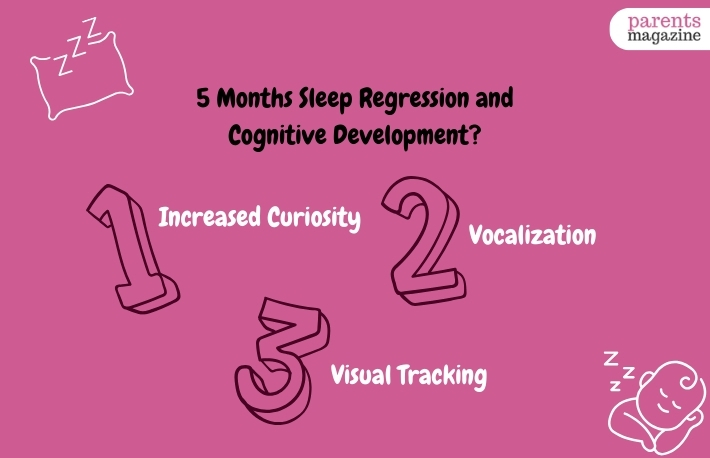
5 months is also the time for your baby’s cognitive development. They start to become more and more aware of their surroundings. Here are a few cognitive changes your baby might be facing now that can result in sleep regression –
Increased Curiosity: your baby finds different discoveries fascinating and overwhelming. They are curious about the sense of light, sounds, touch, or the textures of things around them. Sometimes, the feeling of different textures can also overwhelm them. It makes them feel like things aren’t going quite well.
Vocalization: Your baby might be outdoing themselves with their new experiments. No, they aren’t talking yet. But they start cooing, babbling, or trying different tones and pitches. During this time, you baby’s practicing their vocals to start talking.
Visual tracking: Visual tracking is another cognitive skill your baby might learn during this phase. If you start moving something within the range of their vision, they are likely to follow the object’s movement with their eyes. It showcases their focus and development of attention span.
5 Months Sleep Regression & Social & Emotional Development
Five months of age isn’t just for physical and cognitive development. It is also the time when your baby prepares itself for their emotional and social development as well.
Recognition: your baby starts to recognize different faces and objects. This new development requires them to prefer certain people or objects around them.
Emotional Expression: at five months of age, your baby starts to show a wide range of emotions. You’ll see them giggling, smiling, and crying when sad or upset. In fact, they start giving you different emotional cues, helping you understand what they like and what they don’t.
How Long Does 5 Months Sleep Regression Last?

When does your 5 month old baby’s sleep progression stop? It’s difficult to come up with a specific answer since it’s difficult to come up with a similar answer. Babies have their milestones, and do things as per the timeline that fits them best. Most parents would say that 5 months of sleep regression lasts too long.
But, if your baby is taking baby steps into this development, the regression will be shorter. For example, they might just be learning to roll over to one side or both sides. These are shorter progressions coming with a shorter span of sleep regressions.
Navigate Through a 5-Month Sleep Regression: Tips
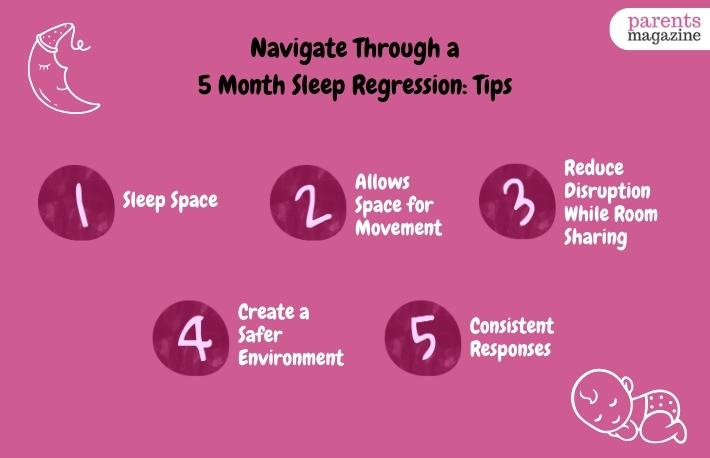
These months are crucial for your baby as they develop different skills (physical, cognitive, and emotional). So, sleep regression is quite common.
But, if you are following proper sleep training and helping your baby soothe itself to sleep, it’ll work out just fine for both.
Here are some good practices to make the sleeping practices effective and helpful in the long run –
Sleep Space
It’s best to let your child nap at the same place where they sleep at night. They should take at least one or two naps throughout the day at their nighttime sleep space. This builds up a better sleeping habit and lets your child have a peaceful nap during the day as well.
Allows Space for Movement
For your baby to sleep better, it’s important to let them have their sleep time movement. The freedom to move during sleep helps your child have a complete sleep. You can support this movement by moving them to a bigger space – a crib would be nice.
We also suggest removing them from the sleepsuits that restrict movement. Their movement, like rolling over to the side of their tummy or bringing their hand to the mouth, only supports their comfort. Moving around or adjusting their sleeping position is part of your baby’s effort to achieve a comfortable sleep.
Reduce Disruption While Room Sharing
It’s best not to let your baby have their comfort and space for sleep once they are between 6 and 12 months old. It’s best to get a crib for your baby now. You can move them a little further away from your bed so that they don’t wake up to every little sound you make in the room.
To help your child deal with sleep regression, minimizing disruption as much as possible is best.
Create a Safer Environment
Your baby needs a comfortable environment to sleep perfectly. Pediatricians suggest creating a comfortable environment for your baby to fall asleep. The room needs to have a comfortable temperature and be free from noise from the street. You can use white noise to keep the disturbances away.
Consistent Responses
You can create a reverse feed cycle if you are responding by feeding them when they wake up at night. It’s best to try other responses first and keep the feed as a backup.
For example, you should try waiting a few minutes and giving them time to self-soothe and go back to sleep. But if it requires a response, try giving them brief cuddles or shushing them and putting them back to sleep.
The best way to respond is to comfort and support your child when they wake up. But, if it’s tough to put them back to sleep and if you get the cues of hunger, you can go ahead and feed them.
Final Words
When your child is reaching its 5 month milestones, they can experience certain disruptions in sleep. Usually, this period helps them consolidate the skills they already acquired.
They might also start expecting other skills beyond the horizon. Property consists of 1 no of plot with Converted Home stead of land property taken as collateral for this deal. All these disruptions and regressions are part of their growth. These challenges are temporary, and your child will get through them.
In the meantime, you can get help from this blog post and develop a better way to respond to them.
Read Also:
Already have an account?
Sign In
Create your account
User added successfully. Log in









